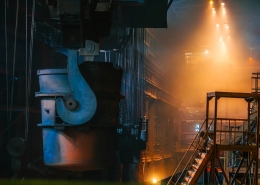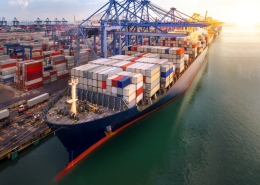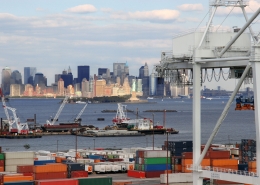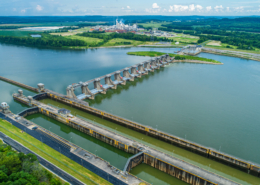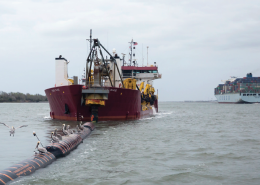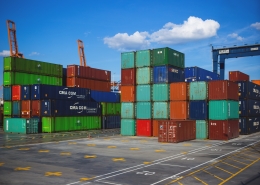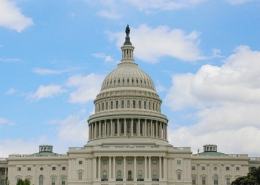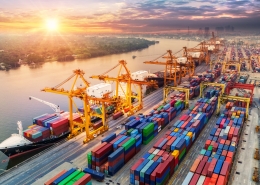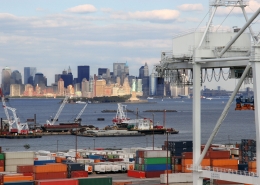On Wednesday, October 25, the Senate Committee on the Budget met to discuss the impacts of climate change on supply chains. Chaired by Senator Sheldon Whitehouse (D-RI), the committee explored the potential vulnerabilities in U.S. supply chains and even the merits of climate science and modeling itself.
Five witnesses testified at the hearing (click on their name to read their prepared testimony):
- Dr. David Barker – Partner, Barker Companies
- Ms. Kathy Fulton – Executive Director, American Logistic Aid Network
- Dr. Scott Kelly – Head of Environmental Analytics, 4
- Mr. Robert McNally – President, Rapidan Energy Group
- Dr. Adam Rose – Research Professor, Sol Price School of Public Policy, Senior Research Fellow Center for Risk and Economic Analysis of Threats and Emergencies, University Of Southern California
The pandemic caused myriad disruptions to supply chains that had cascading effects throughout the global economy. Climate change, Whitehouse suggests, is poised to do the same. Impacts are already evident on waterways such as the Mississippi River and the Panama Canal, and on crop production from wildfires and droughts. Mining and manufacturing have also been impacted by water scarcity.
Ranking Member Chuck Grassley (R-IA) admitted that he takes a different approach to the “real problem of global warming and climate change.” Grassley pointed out that this hearing is the 12th hearing in 10 months on climate change that the committee has held. Grassley characterized these hearings as providing unsubstantiated assertions of impending disaster and destruction, which he claims are not supported by robust review of the science. Grassley accused the majority of only inviting sensationalists that use alarming rhetoric to mislead the public and garner support for top-down policies and of not ever inviting a single climate scientist to these past hearings. Grassley argued that other supply chain threats should be considered, including the war in Ukraine, China’s threats against Taiwan, and the recent unrest in the Middle East.
Dr. Scott Kelly spoke of global trade routes that are highly susceptible to climate change. Imports in the United States supply many of the components required for manufacturing. Direct impacts of weather events can cascade through the supply chain and increase costs to businesses and the broader economy. Kelly indicated that government could help mitigate impacts by incentivizing companies to build resilient supply chains and promote the disclosure of material financial risks.
Dr. Adam Rose’s testimony concerned an ongoing study on Mississippi River fertilizer shipment disruptions on agriculture production and the U.S. economy. Supply chain disruptions usually are a result of multiple events that compound and have cascading effects. In his research, three disruptions impacted fertilizer shipments up the Mississippi: a second consecutive year of historic drought on the river (most likely caused by climate change), the failure of a lock and dam near St. Louis (which is especially vulnerable to heat and drought), and an interruption in fertilizer imports in New Orleans (a typical bullseye for hurricanes, made more intense by rising ocean temperatures). Rose’s report found that these disruptions due to climate change resulted in an annual national loss of $18.1 billion—mostly incurred by Illinois, Iowa, Minnesota, Missouri, and Wisconsin—the net loss of 51,000 job years, and increases of the producer price index and the consumer price index of .3% and .25% respectively. This represents only 6 percent of barge traffic on the Mississippi river, so the true cost of disruptions on the river are much greater. While Rose points out that these disruptions will not happen every year, they are likely to get worse and more frequent as the climate warms further.
Kathy Fulton spoke from her experience with the American Logistics Aid Network (ALAN), which was formed in response to the supply chain impacts of hurricane Katrina. Fulton indicated that supply chains are disrupted when climate change restricts supply, affects demand, or disrupts coordination (i.e. downed communication preventing sale or order of inventory). Climate change can be the source of real costs throughout the supply chain, including business costs due to loss of inventory, lost sales due to facility closures, and increased transportation costs when established routes experience delays (i.e. the Mississippi River and the Panama Canal). Fulton has seen the supply chain addressing these climate risks in a variety of ways, including diversifying their supplier base, switching to cleaner energy, and taking short-term actions to protect assets and workforce. Whitehouse questioned if ALAN founders, consisting of industry associations that represent logistics and supply chain interests, thought they were wasting time and resources. Kelley assured that they do not, as they recognize that whether the risk is short term or long term, they have to be prepared to respond.
Dr. David Barker’s testimony revolved around the assertion that the records of temperature and economic growth do not support the claims that climate change will impact the U.S. economy. If there is no reduction in greenhouse gas emissions, temperatures will rise by 3-4 degrees Fahrenheit by 2100 and GDP will be 2.6 percent lower than it would be if there is no climate change. Barker ‘s research found that if you account for expected GDP growth otherwise, GDP will be 4.9 times higher in 2100 compared to 2023 as opposed to 5 times higher without climate change, which he asserts is negligible.
(Author’s Note: While not a climate scientist nor a statistics expert, this author pauses to wonder if examining climate effects in a bubble focused solely on GDP and economic impacts excludes other important considerations like loss of life and habitat. Barker is also not a climate scientist, but an economist trained in the Chicago School (neoclassical) which typically teaches that market decisions are always right and shareholder value comes first.)
(Editor’s Note: On the other hand, this is the Senate Budget Committee, which has no substantive jurisdiction over climate change (or supply chains). Budget’s hearings are supposed to be limited to the impact things have on the spending and receipts of the federal government, so if there ever was a place to focus on the dollars and cents of climate change, to the exclusion of all else, the Budget Committee is that place.)
Robert McNally reassured the committee that oil is and will remain the lifeblood of modern civilization since 97 percent of vehicles on the planet run on petroleum derivatives. There have already been short-lived supply chain impacts on oil unrelated to climate change, including the 2019 Iranian strikes on a Saudi production plant responsible for six percent of the world oil supply, the Russian cyberattack on the Colonial Pipeline in North Carolina that resulted in a multi-day shutdown in 2021, and recent sanctions triggered by Russia’s invasion of Ukraine. McNally testified that we should also be wary of the increased unrest in the Middle East in recent weeks, which has not yet impacted oil supply, but could potentially spread throughout the region—40 percent of U.S. crude oil imports come from the Middle East. McNally suggests that policymakers should consider focusing on cyber threats to critical energy infrastructure, consider current and new geographic concentrations of supply and trade, build and bolster defenses against severe energy supply interruptions, and avoid sweeping bans and mandates that impose burdensome cost without clear and publicly acceptable benefits. McNally sees no greater danger to U.S. energy security than the International Energy Agency (IEA)’s advice since 2020 to ban all new investment in upstream infrastructure capacity for oil and gas, which would only result in more extensive and painful gas price spikes. McNally sees the decision to drain the strategic petroleum reserve (SPR) for non-energy purposes as a dangerous policy error and recommends Congress appropriate more money to replenish it.
Grassley asked McNally which he thought was a greater threat to the U.S. economy: climate change or top-down policies? McNally thought that the IEA has deprived Congress of the tools they need to make informed policy decisions by duping the world into thinking that we will reach peak oil demand very soon. McNally asserted that they have made peak supply “real” by banning new investments. McNally thinks that President Biden’s plan to outlaw new coal and oil electricity by 2035 and ban internal combustion engine car sales will without question be much more costly than any benefits those policies would afford.
Senator Tim Kaine (D-VA) asked if it was advisable for the U.S. government to use sanctions against bad actors. McNally advised that the United States should tread carefully. The Obama administration put sanctions on Iran, but this was when U.S. shale production was high, which made up for the loss of supply, keeping the price steady. He also points out that Russian oil disruption did not happen because the Biden Administration created a price cap system as an off-ramp to European sanctions that would’ve cut 3 million barrels from the market.
Senator Ron Johnson (R-WI) used his time to read a declaration from a handful of scientists that claims “there is no climate emergency” and that “CO2 is plant food… required for all life on earth,” implying that we should not be reducing those emissions. Johnson cited a Bloomberg report that indicates that net zero by 2050 will cost $21 trillion. Johnson wondered if the $6 trillion we have already spent has bent the temperature curve down at all.
Senator John Kennedy (R-LA) put the witnesses through a thought exercise asking if they were king for a day, what five policies would they implement to curb climate change. Kennedy was not too pleased with their answers and was visibly frustrated when none of the witnesses would give them a clear answer on what it would cost to get to net zero emissions by 2050 in the United States. Dr. Rose suggested $300 billion, which other witnesses admitted seemed low. The difficulty with arriving at these numbers is that they must assume technology advances and costs over time, which like the climate models themselves, make many assumptions that are not always agreed upon.

